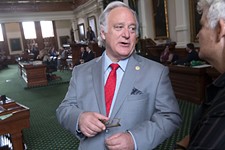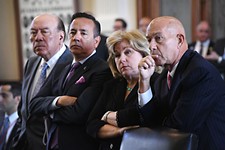Gov. Perry's Ham-Fisted Veto Pen Strikes Again
Lege coverage
By Richard Whittaker, Fri., June 22, 2007
In a final flurry of red ink, Gov. Rick Perry vetoed a slew of bills last Friday, just before the Sunday deadline. Through a mixture of simple vetoes and line-item deletions, Perry killed 49 bills, on top of three already vetoed in May, and struck more than half a billion dollars out of the budget.
The dead bills crossed party lines and hit both chambers: Twenty-five of the 44 House bills and resolutions vetoed came from Republicans, while Democrats authored five of the eight Senate bills killed on Perry's desk. Legislators are attacking Perry for what they see as a high-handed approach that killed bills with no consultation, and state agencies are countering what they see as unfair criticism by the governor.
Some of the most extensive cuts were in Perry's line-item vetoes of the final budget. He cut $646.5 million out of the total, with 23 items being dropped. Some of this was housekeeping, removing riders for bills that didn't pass or were vetoed, but there were some big-budget deletions. Perry caused a storm when he slashed the entire 2009 budget for group insurance contributions for community and junior colleges, worth $153 million. In his proclamation, Perry accused community colleges of falsifying their reports and inflating their request by $126 million – a charge the Texas Association of Community Colleges has called outrageous. "We're stunned," said Steven Johnson, TACC's director of external relations. "The Legislature has looked at this for the last two sessions and found no problem. Even the governor's own budget proposal in February did not include this cut. This has fractured the historic relationship between the local areas and the state."
Some of the biggest attacks came on higher education. Calling its funding "seriously flawed" and attacking legislators for making universities dependent on "pork barrel spending," Perry lopped off $36 million in special items, including $2 million for obesity research at the Texas Cooperative Extension and $5 million for public-health programs at the UT Health Science Center at Houston, which he called redundant duplicates of other projects.
Perry also saved some fearsome criticism for the Legislative Budget Board, the office that produces fiscal notes – the calculations of the running costs of all Texas state agencies and the potential price tag of any legislation. Savaging them for underestimating or just ignoring the true cost of bills, he said their work did not make "the state budget the clear, transparent document it should be for the citizens of Texas."
This criticism wasn't restricted to the bills he vetoed. In allowing Senate Bill 453 – mandating HIV testing for all new inmates of Texas prisons – to pass unsigned, he attacked the LBB for producing numbers that were "deeply flawed and misleading." They hadn't calculated the cost of the tests or of future treatment for HIV-positive inmates. This meant that legislators did not know the true cost of the law they passed, Perry said, and he urged them to reform the entire fiscal note process.
Educators were also hit hard by many of the vetoes, such as House Bill 1427, which funded a summer program at the University of Houston's College of Optometry, and HB 3457, a broadly supported bill by Scott Hochberg, D-Houston, which would have ended the expensive and polluting habit of leaving school buses idling. Many bills relating to the conditions of prisoners were struck down as well. Perry threw out HB 2990 by House Corrections Chair Jerry Madden, R-Plano, which would force all inmates, staff, and visitors to a Texas Department of Criminal Justice facility to be tracked with a radio frequency identification transmitter – but only because the money wasn't in the budget. Back on May 25, Perry had already vetoed HB 770, which would have mandated TDCJ to inform released felons of their right to vote. Bill author Rep. Harold Dutton, D-Houston, said he is still waiting to discuss the veto with Perry. "They didn't talk to me; they just sent me an explanation that I didn't think much of," said Dutton. He also said that Perry's argument that this wasn't TDCJ's job and that it would cost extra didn't hold up since the agency already sent these letters out – in part because Dutton had already introduced similar bills in the last two sessions. "If they're already doing it, I don't see how this would add any more cost to it," Dutton said. "I still wish it had become a law, because then he couldn't stop them doing it."
Similarly, Rep. Terri Hodge, D-Dallas, had no consultation with Perry's office before he killed two of her prison-related bills. HB 44 would have given wardens the discretionary power to return good-behavior time forfeited for minor offenses to nonviolent offenders – a move backed by TDCJ that Hodge said would be an incentive for rehabilitation among prisoners and make corrections officers' jobs easier by cutting overcrowding and discipline problems. HB 47 would have allowed education of inmates on administrative segregation in their cells; Perry claimed this would cost almost $3 million, a charge Hodge called inflated, and she would have told him so, if they had ever met to discuss it.
"I think it's unfortunate that neither the governor nor his staff spoke to me or anyone on my staff," said Hodge, "to see if there was anything we could do to make these bills a little different or a little better, so the governor could have signed them." Hodge couldn't understand why the decision was so arbitrary and said, "We have a governor that is in charge of a state with the second biggest prison population in the country, and it's unfortunate they either know or care so little about it that we aren't doing some of the minor, sensible things to educate these people better and stop wasting so many tax dollars on the prison system. That way, we could spend that money on education and reduce our prison population, period."
Got something to say on the subject? Send a letter to the editor.











